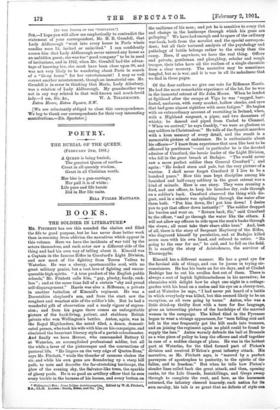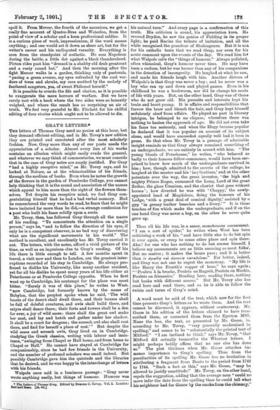BOOKS.
THE SOLDIER IN LITERATURE.* Frrotrorr has ere this sounded the clarion and filled the fife to good purpose, but he has never done better work than in rescuing from oblivion the narratives which appear in this volume. Here we have the incidents of war told by the actors themselves, and each actor saw a different side of the thing and had his own way of telling about it. Kincaid was a Captain in the famous Rifles in Craufurd's Light Division, and saw most of the fighting from Torres Vedras to Waterloo. He was a cheery, sportsmanlike soul, with no great military genius, but a vast love of fighting and uncon- querable high spirits. "A true product of the English public schools," Mr. Fitchett calls him, " gay, plucky, •hardy, reck- less " ; and at the same time full of a certain "shy and proud self-disparagement." Harris was also a Rifleman, a private in another battalion of Kincaid's regiment. He was a Dorsetehire shepherd's son, and from the start saw the roughest and weariest side of the soldier's life. But he had h wonderful gift of observation and a ready vigour of expres- sion ; and from his pages there comes an unforgettable picture of the hard-living, patient, and stubborn British private who won Wellington's battles. Anton, again, was in the Royal Highlanders, the noted 42nd, a donee, domesti- cated person, who took his wife with him on his campaigns, and cherished the luxuriant literary style of a parish schoolmaster. And finally we have Mercer; who commanded Battery G at Waterloo, an accomplished professional soldier, but all the while a lover of the picturesque and the conventions of pastoral life. "He lingers on the very edge of Quatre-Bras;" says Mr. Fitchett, " while the thunder of cannons shakes the air, and while his own guns are floundering up a steep hill path, to note and describe the far-stretching landscape, the glow of the evening sky, the Salvator-like trees, the sparkle of glassy pools. He is so good an artillery officer that he sees every buckle in the harness of his horses, and every button on
• Wellington's Wen: Some Soldier Autobiographies. Edited by W. H. Pitobett, BA., LL.D. London: Smith, Elder. and Co. [6s.] the uniforms of his men ; and yet he is sensitive to every tint and chairge in the landscape through which his guns are galloping." We have had enough and to spare of the ordinary war-book, both from the novelist and the special correspon- dent; but all their tortured analysis of the psychology and pathology of battle belongs rather to the study than the camp. Here, if anywhere, we have the real thing. Officer and private, gentleman and ploughboy, scholar and rough trooper, their tales have all the realism of a single chronicle from a clear memory. The narrative may be sometimes tangled, but so is war, and it is war in all its nakedness that we find in these pages.
Of the four authors we give our vote for Rifleman Harris. He had the most remarkable experience of the lot, for he was in the immortal retreat of Sir John Moore. When he landed at Spithead after the escape at Vigo he was "ragged, bare- footed, unshaven, with rusty musket, hollow cheeks, and eyes that bad gone almost sightless with mere fatigue." He begins with an extraordinary account of recruiting in Ireland, when, with a Highland sergeant, a piper, and two decanters of whisky, he danced and piped from Cashel to Clonmel. " When we arrived," he says frankly, "we were as glorious as any soldiers in Christendom." He tells of the Spanish marches with a keen memory of every detail, and the result is a memorable picture of endurance. He is enthusiastic about his officers—" I know from experience that men like best to be officered by gentlemen "—and in particular he is the devoted admirer of Craufurd, the heroic leader of the Light Division, wbo fell in the great breach at Badajos. " The world never saw a more perfect soldier than General Craufurd";' and again : " He looked stern and pale, but the very picture of a warrior. I shall never forget Craufurd if I live to be a hundred years." How this man kept discipline among his famished and half-crazy soldiery in the great retreat was a kind of miracle. Here is one story. They were crossing a ford, and one officer, to keep his breeches dry, rode through on a soldier's back. Craufurd observed the thing with dis- gust, and in a minute was splashing through the water after them both. " Put him down, Sir ! put him down ! I desire you to put that officer down instantly ! " The soldier dropped his burden and went on. " Return back, Sir," said Craufurd to the officer, " and go through the water like the others. I will not allow my officers to ride upon the men's backs through the rivers ; all must take their share alike here." And, best of all, there is the story of Sergeant Mayberry of the Rifles, who disgraced himself by peculation, and at Badajos killed seven men with his own hand, and refused to retire. " No going to the rear for me," he said, and he fell on the field. It is exactly the story of Aristodemus, the survivor of Thermopylae.
Kincaid has a different manner. He has a great eye for the farcical side of things, and can be jocose in trying cir- cumstances. He has his boots on for six days, and at Ciudad Rodrigo has to cut his swollen feet out of them. There is always a sort of boyish lightheartedness in his narrative; he chronicles with delight how he slept one night in a cottage- garden with his head on a melon and his eye on a cherry-tree, and at Waterloo he says, "I had never yet heard of a battle in which everybody was killed, but this seemed likely to be an exception, as all were going by turns." Anton, who was a little dried-up thrifty Scot with a turn for fine language, gives an interesting picture of the hardships of the married women in the campaign. The kilted 42nd in the Pyrenees began to wear a strange appearance, for "men falling sick and left in the rear frequently got the kilt made into trousers, and on joining the regiment again no plaid could be found to supply the loss." Anton warmly defends the ball at Brussels as a wise piece of policy to keep the officers and staff together in case of a sudden change of plans. He was in the hottest part at Waterloo, for the 42nd formed part of Picton's division and received D'Erlon's great infantry attack. His narrative, as Mr. Fitchett says, is "marred by a perfect paroxysm of apostrophes to posterity, to the spirits of the fallen, and to freedom." But when he tells how Picton's slender lines rolled back the great attack, and then, opening ranks, let the Life Guards, Inniskillings, and Greys sweep through to complete the rout, and how, as the horsemen returned, the infantry cheered hoarsely, each nation for its own cavalry, his tale is so great that no defects of style can
spoil it. From Mercer, the fourth of the narrators, we get a really fine account of Quatre-Bras and Waterloo, from the point of view of a scholar and a keen professional soldier. It is a curious piece of work, impressionism, if the word means anything ; and one would set it down as sheer art, but for the writer's career and his undisputed veracity. Everything is seen from the standpoint of aesthetic. He sees Napoleon during the battle, a little dot against a black thundercloud. Picton rides past him "dressed in a shabby old drab greatcoat and a rusty round hat." And then the morning after the fight Mercer walks in a garden, thinking only of pastorals, "pacing a green avenue, my eyes refreshed by the cool ver- dure of trees and shrubs, my ears soothed by the melody of feathered songsters, yea, of sweet Philomel herself."
It is possible to overdo the fife and clarion, as it is possible to exaggerate the mere horrors of warfare. But we have rarely met with a book where the two sides were so honestly weighed, and where the result has so surprising an air of truth. We feel very grateful to Mr. Fitchett for his skilful editing of four stories which ought not to be allowed to die.



































 Previous page
Previous page